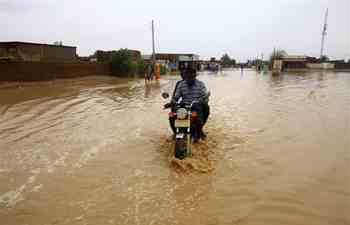By George Georgakopoulos
ATHENS, Aug. 4 (Xinhua) -- Greece is preparing for the end of its third bailout program this month, it has officially returned to growth and the economic sentiment is improving.
However, consumers and experts agree its economy is nowhere near the rebound, it requires to return to prosperity and convince the markets and the investors it is worth investing in.
Rather than hitting the ground running, the Greek economy is seen limping out of the euro zone-funded program.
The bailout's purpose was to prepare Greece's return to the capital markets, but as yields stand at prohibitively high levels, the country is instead planning to meet its debt servicing needs by its own means.
Markets are not yet convinced Greece offers a credible investment option. "The Greek bond yields remain high in comparison to other countries, although they have gone down compared to previous years. They highlight that there is no confidence in Greece, and this has been aggravated by the government's handling of the recent deadly fires in Attica, as this rendered evident the incapacity of the administration," Nikolina Kosteletou, lecturer of economics at the University of Athens, told Xinhua.
"I don't know how Greece will pay for it in market terms, but it will also depend on how the exit from the bailout program takes place in general," she added.
Greek central banker Yannis Stournaras has warned that the markets will punish Greece if it backtracks on its reforms. Athens has already hinted it may renege on its pledge to cut pensions from January 2019, and that it may offer more handouts, ahead of the elections looming.
"By offering handouts, all we will do is to burden the economy further. We need to give a chance to the economy to grow, especially exports that should have grown far more than they have actually done. In Greece it is only tourism that is doing well, nothing else," pointed out Kosteletou, also a governing board member at the Independent Authority for Public Revenue (IAPR).
Official projections point to a 2 percent economic expansion this year, and the Economic Sentiment Index of Greece's Foundation for Economic and Industrial Research (IOBE) showed in July its highest reading in the last four years.
However consumer confidence showed no improvement last month, according to IOBE, as the main tax-paying season has started, and the property tax is expected to be heavier for many property owners later in the year.
Also the Purchasing Managers Index (PMI) compiled by IHS Markit recorded a slowdown in the growth of new orders and output in manufacturing in July, although figures continued their advance for a 14th month in a row.
The election cycle of 2019, with general, local and European elections to come in the next 12 to 14 months, the further cuts to pensions planned for 2019 and other austerity measures applying from next year, put a healthy recovery into further doubt.
Kosteletou is not so sure whether Greek politicians have learned from past mistakes and will not repeat them. "Recent experience has shown we are not learning from our mistakes, as has also been the case with the forest fires, with the deadly account of 2007 getting even worse this summer," she said referring to the wildfire that claimed the lives of more than 90 people in Attica last month.
"In the economy avoiding past mistakes is even more difficult, as it is likely the politicians will choose the easy path of handouts, hirings, and swelling of the public sector again. I am not even sure the opposition is able to change that," added Kosteletou.
Another concern relates to the projected state revenues; last year's outperformance through the unexpectedly high social security contributions to the main pension fund (EFKA) will not only fail to be repeated this year according to existing figures, but have also contributed in the shrinking of the income tax expected in 2018.
"It is certain that the decline in income tax revenues expected is related to EFKA contributions, but it is largely coincidental: Many self-employed professionals decided to close their books and either form companies that have lower tax - which has been the good scenario - or unfortunately continue operating in the illegal economy, due to the high taxation and social security contributions," Kosteletou told Xinhua.
The IAPR board member particularly points out that "revenues from value-added tax are not doing well. Tax revenues will perform well only if the economy marches on."
The lack of foreign direct investment is another major concern for the economy, as besides some major projects such as privatizations, investment has been lagging in Greece.
Bureaucracy, taxation and the slow justice are typically cited as some of the main reasons for that: "A key dimension is the efficiency of the local justice system. The delays in the operation of Greek justice are a major obstacle to Greece's recovery," commented Kosteletou.
"I am not optimistic for the future, as Greece needs a change in mentality above all, and I do not see that in the horizon," she concluded.













